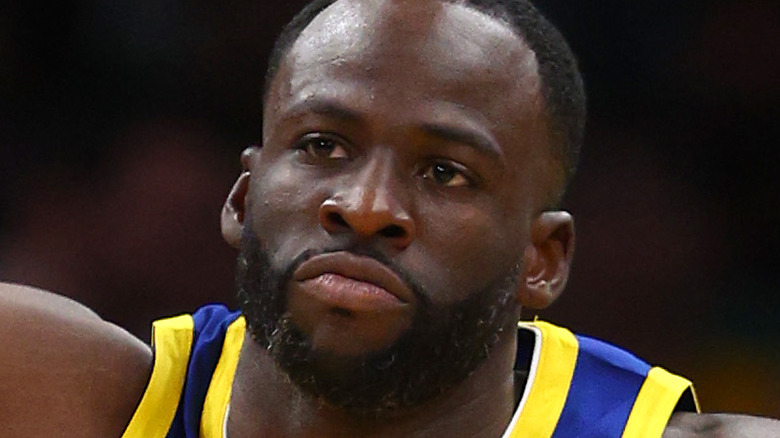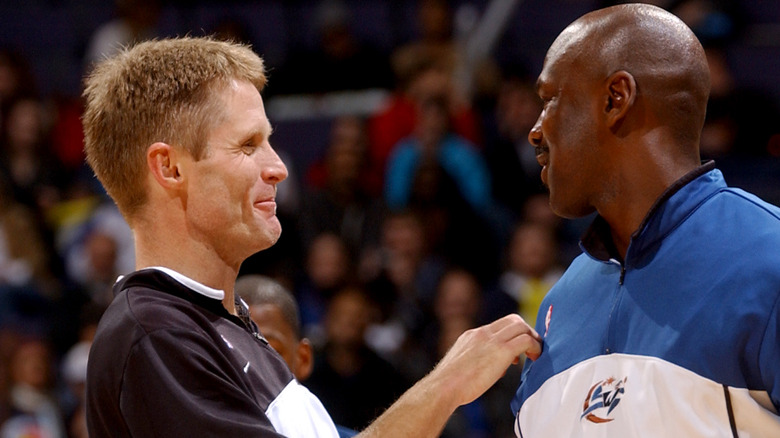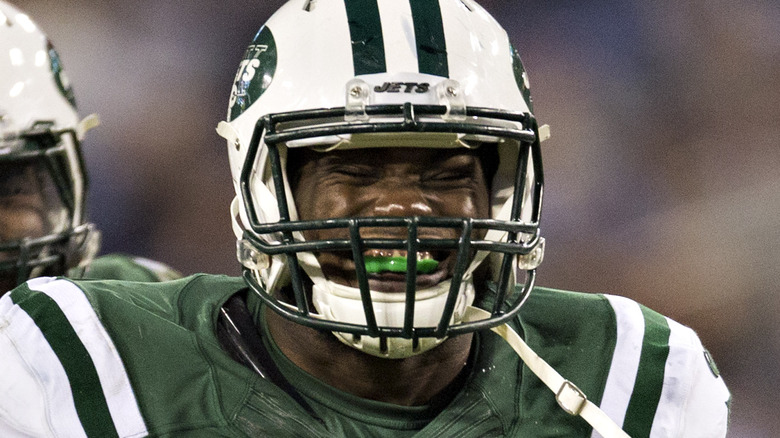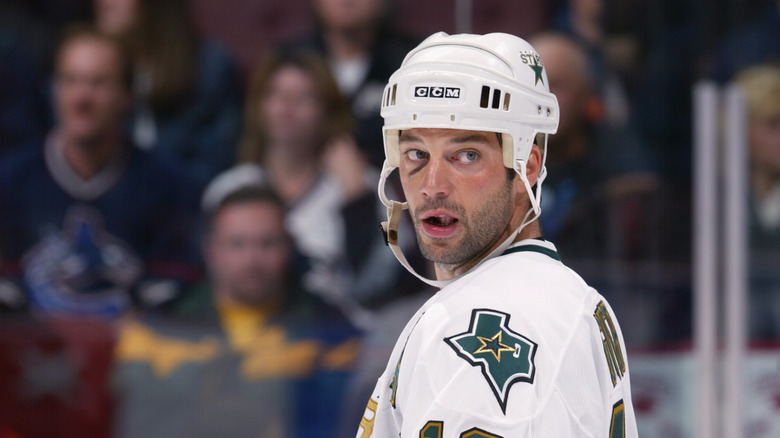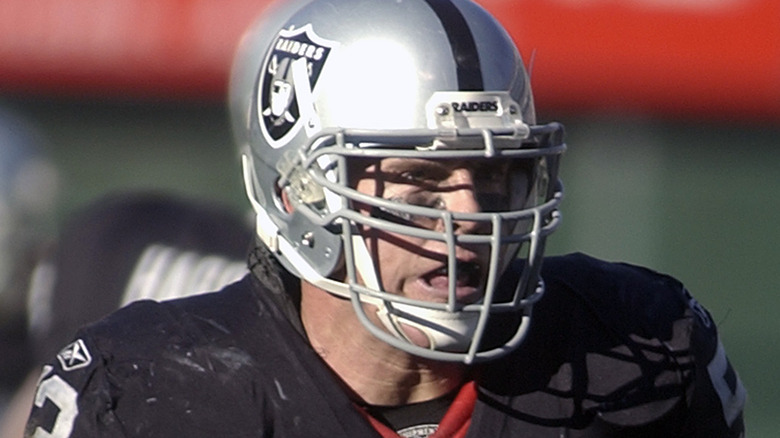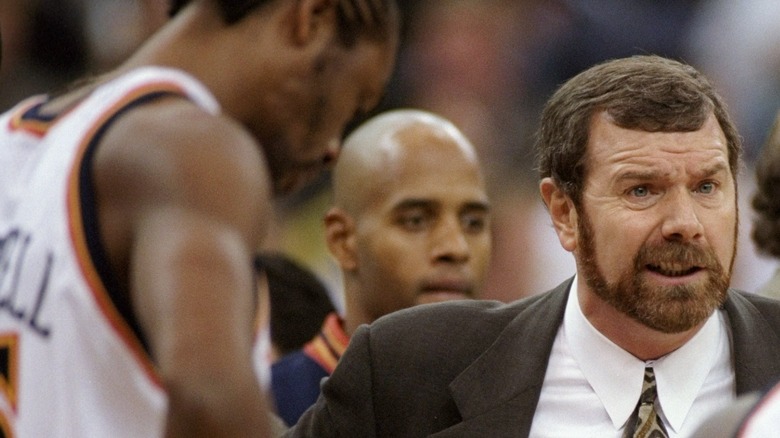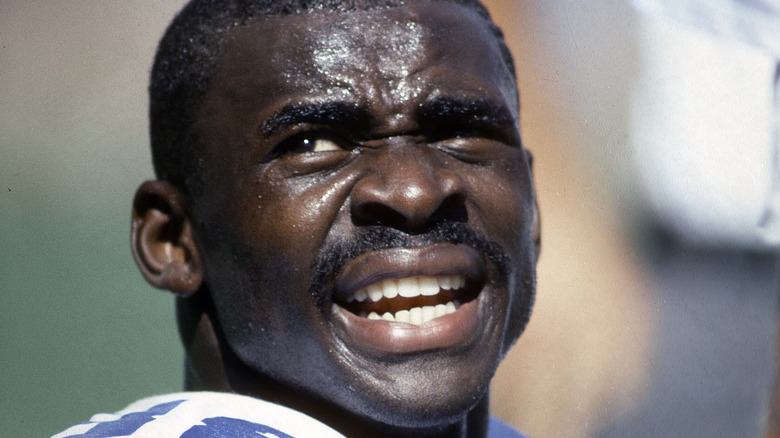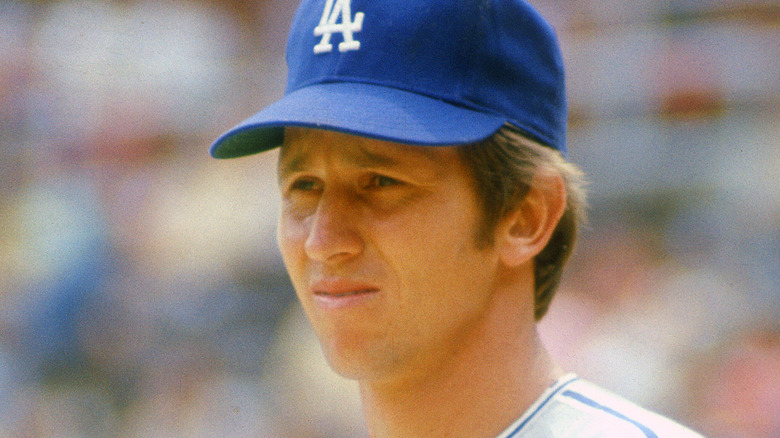Athletes And Coaches Who Lost It On Their Own Teams
Professional sports are all about the triumph of the human spirit, and the greatest athletes in the world pushing themselves and their teammates to commit almost superhuman acts of physicality. They're made better by enduring rivalries and a competitive fire that drives coaches and players to train, work hard, come through in clutch moments, and win those big games when they matter most. Modern pro sports are also highly competitive and highly scrutinized — coaches and athletes alike are under tremendous and constant pressure to win, to make good on their team's substantial investment, and to please diehard fans.
All that stress can manifest in odd ways, like annoyance, loathing, hatred, and other bad feelings usually reserved for opponents getting directed at people on the same team. Not everyone can get along with everyone else, and workplace disputes are common in virtually every industry, but in the top levels of sports, it's downright salacious when those disagreements turn violent.
Here are some notable times when professional athletes (and their coaches) came to blows with members of their own teams.
Michael Jordan v. Steve Kerr
Michael Jordan and Steve Kerr were teammates on the Chicago Bulls in the 1990s, forming the team's starting backcourt during a period in which they'd win three NBA championships together. Jordan would capture more titles without Kerr, and Kerr would go on to win four titles as head coach of the San Antonio Spurs, so both athletes would have to be competitive and show intensity in their game, and their individual styles clashed violently during a preseason training camp scrimmage back in the '90s.
"I disagreed with him one time," Kerr told "The Dan Patrick Show" in 2012 (via NBC Sports). "I think he punched me in the face." It all went down after Jordan made a comment to Kerr, to which Kerr took umbrage and then stood up to the NBA legend and team leader to let him know he didn't like what he said. And Jordan responded by striking Kerr in the face. But in retrospect, Kerr didn't seem to mind the punch. "It was one of the best things that ever happened for me. I needed to stand up and go back at him, I think I earned some respect."
Bobby Knight v. his own players
Bob Knight is one of the most accomplished coaches in college basketball history. During a 29-year coaching stint at Indiana, he led the team to three NCAA championships, never posted a losing record, and won numerous "coach of the year" accolades. He's also notoriously temperamental, according to the Houston Chronicle. Caught screaming at referees more than once, and ejected for throwing a chair across the court in 1985, Knight frequently directed his players at his own players and other students.
In 1975, riled by his squad giving up the ball twice in short order, Knight yanked player Jim Wisman by his jersey and tossed him into a chair. Six years later, during a crucial Final Four game, Knight engaged in some shoving with a fan from LSU, confronting Knight after he said the coach stuffed him into a garbage can earlier in a hotel. In 1986, after earning a technical foul for yelling at referees, Knight kicked a megaphone and then launched into a tirade against Indiana's cheerleaders, who he felt interrupted a free throw attempt by one of his players. Knight earned a one-game suspension in 1993 after kicking one of his players on the sidelines — and that player was his son, Pat. A year later, he head-butted Sherron Wilkerson during a timeout (claiming it was an accident), choked player Neil Reid at a practice in 1997 (per the Washington Post), and in 2006, slapped player Michael Prince in the chin.
Ikemefuna Enemkpali v. Geno Smith
Ikemefuna Enemkpali joined the New York Jets in 2014, a year after Geno Smith arrived and ascended to the position of starting quarterback. They got along well enough that in 2015, Enemkpali invited Smith to his Texas-based football camp and paid for his plane ticket to attend, according to New York Newsday. After the death of a friend, Smith bowed out of his appearance and offered to pay back Enemkpali for the cost of the ticket, but Smith still hadn't done so by the time Jets training camp began in August 2015. Enemkpali confronted Smith in the locker room about the matter, things got heated, and he wound up punching the quarterback in the jaw.
The Jets immediately released Enemkpali (who signed with the Buffalo Bills and apologized to the Jets franchise and fans, but not Smith directly). According to the NFL, the altercation left Smith with a jaw broken in two places, an injury so severe that he was expected to miss six to 10 weeks of the 2015 NFL season.
Draymond Green v. Jordan Poole
In June 2022, the Golden State Warriors won their fourth NBA title in eight years (per CBS Sports), and part of the credit goes to the tenacious defense of all-star Draymond Green and the sharp-shooting of breakout Jordan Poole. Less than four months later, TMZ obtained video footage of the Warriors teammates engaging in a verbal altercation that turned very violent very quickly.
During a training camp-set team practice before the beginning of the 2022-23 season, Green and Poole were reportedly critical of each other's skills. It got to the point where Green casually strode up to Poole and put his face right up in his, prompting Poole to angrily shove Green away. Green responded extremely quickly, cold-clocking Poole with a punch to the face so powerful it knocked him to the ground, disorienting him momentarily. According to TMZ, sources close to the team said that Poole had been acting arrogantly in the days leading up to the fight, wanting a higher salary, and earlier in the practice, Green reportedly called Poole a "b****" several times.
"These things happen. Nobody likes it. We don't condone it, but it happens," Warriors general manager Bob Myers said. At a press conference (per the Washington Post), Green publicly apologized. According to ESPN, Green was subject to a fine, but not a suspension, although he took a self-imposed leave of absence from the team.
Bill Guerin v. Brett Draney
In preparing for the 2002-2003 hockey season, the Dallas Stars played an intra-team game during training camp in Breckenridge, Colorado. Star winger Bill Guerin, who'd just signed a five-year contract extension worth $45 million, landed on one side, while up-and-coming prospect Brett Draney, recently elevated from the minor league Western Hockey League, was on another. In the course of play, Guerin body-checked Draney and body-checked him hard, using his stick as both leverage and weapon. According to ESPN, Guerin slashed Draney in the neck with the blade of his stick and then hit him in the back when he was already down. Draney got off the ground and tried to restart the fight, but it quickly ended.
According to the Canadian Press (via Tapatalk), historical precedent for an in-season attack on an opponent of this nature would carry a minimum of a 10-game suspension. But Guerin's assault occurred during a pre-season scrimmage game where the Dallas Stars roster was split into two. The NHL head office heard about the incident but had no authority over a game of that type, and Stars leadership opted not to punish Guerin. "It looked worse than it really was," a team spokesperson told reporters.
Bill Romanoswki v. Marcus Williams
During a 2003 practice, the Oakland Raiders split into teams for a scrimmage. Second-year tight end Marcus Williams got matched up against veteran Pro Bowl linebacker Bill Romanowski. In what seemed to be a standard play, Williams scrambled upfield and managed to block out Romanowski, forcing him toward the edge of the field, according to ESPN. Romanowski was so incensed that after the play was over, he grabbed Williams by the neck of the jersey. Williams broke free and raised his arms in surrender, but Romanowski wasn't having any of that, yanking on the face mask of his teammate's helmet forcefully and repeatedly until the whole piece of equipment came off. Williams' head violently jerked forward and backward, and at the moment the helmet came off, his face met Romanowski's first. Cold-clocked by an NFL linebacker, Williams crumbled to the ground, briefly losing consciousness and suffering a chipped tooth and a completely destroyed eye socket. Seconds later, he woke up, and found Romanowski standing over him, shouting, "Don't ever f***in' hold me!"
The Oakland Raiders fined Romanowski $60,000 for his transgression; Williams was so severely injured that he never played in another NFL game. And although he was never charged with a crime, Romanowski was still subject to a lawsuit from Williams, which resulted in a $340,000 payout, according to ESPN.
Latrell Sprewell v. P.J. Carlesimo
On November 8, 1997, the Golden State Warriors were in the midst of a 35-point blowout loss to the Los Angeles Lakers. According to the San Francisco Chronicle, the Warriors' all-NBA guard Latrell Sprewell could be seen on the sidelines, laughing, and head coach P.J. Carlesimo thought such behavior was so inappropriate that he tossed the player from the game. Sprewell responded by calling Carlesimo "a joke" along with some profane words. Later that week, Carlesimo tossed Sprewell from a team practice and wouldn't let the player start a game against the Detroit Pistons. Those strikes, along with Sprewell reportedly privately stewing about his coach, led to a violent incident during a December 1, 1997 practice. In two separate instances, Sprewell physically attacked Carlesimo, both punching him (per the New York Times) and wrapping his hands around the coach's neck, choking him so severely that he left a three-inch-wide impression.
The NBA suspended Sprewell for 82 games — the equivalent of an entire season — and without pay, although an arbitrator later reduced the sentence to 68 games and let the player get back some of his salary. Just after his suspension ended, the Warriors traded Sprewell away.
Barry Bonds v. Jeff Kent
For six seasons in the late 1990s and early 2000s, Jeff Kent and Barry Bonds were teammates on the San Francisco Giants. According to the New York Times, the duo was explosively productive for the team during that time period, with Kent hitting 175 home runs and amassing 689 runs batted in, while Bonds knocked out 279 homers and drove in 659 runs. Both players won a National League Most Valuable Player award. And yet, Kent and Bonds decidedly did not get along. In June 2002, during an away game against the San Diego Padres, Kent and Bonds got into a fight in the visitors' dugout, fully in view of hundreds of fans (and TV cameras). Trainer Stan Conte and manager Dusty Baker had to break it up while the other players stood there and let them fight, per the Los Angeles Times.
Prior to the start of the 2003 season, Kent left the Giants for the Houston Astros, and reflected on the dugout fight. "You guys thought it was the only time we ever did that," Kent told reporters. "I said the day after it was about half a dozen times we did that, but it went over the media's head." Kent even credited the team tension for making the Giants so good. "We went to the World Series," he said. "If you have guys fighting in the dugout and they're winning the ballgames, then fight. Let's go."
Michael Irvin v. Everett McIver
In the summer of 1998, the Dallas Cowboys held their training camp on the campus of Midwestern State University in Wichita Falls, Texas. Players stayed in dormitories, and a barber was brought in to give them haircuts. According to The Versed, Everett McIver, a right guard new to the Cowboys after stints with the New York Jets and Miami Dolphins, was in the midst of a haircut when superstar all-pro wide receiver Michael Irvin approached and demanded he vacate the barber chair immediately. Why? "Seniority!" Irvin reportedly screamed four times. "Punk, get the f*** out of my chair!" Irvin told McIver, who left the chair, not to cede to Irvin but to shove him. Punches were thrown and Irvin grabbed a nearby pair of scissors, plunging them into McIver's neck, barely missing the carotid artery, which could have been a fatal act.
According to the Dallas Morning News (via the New York Times), Cowboys owner Jerry Jones mediated a financial settlement between the players. In exchange for not filing criminal charges against Irvin or publicly discussing the stabbing, McIver would reportedly receive a six-figure sum. It was in the Cowboys' interests to do so, according to ESPN, as Irvin was on probation for a drug charge, and this strike on his record likely would have led to prison time and an interruption in his Hall of Fame-level football career.
Darryl Strawberry v. Keith Hernandez
In March 1989, according to the New York Daily News, the New York Mets traveled to Port St. Lucie, Florida, for spring training and other before-season activities. While the entire roster slowly assembled for their annual team photo, with reporters and television crews looking on, star outfielder Darryl Strawberry made some angry comments while pointing at star first baseman Keith Hernandez. And then, suddenly, he ran through the mob of players and attacked his teammate. He didn't get in a punch, as Dwight Gooden and Bob Ojeda stepped in to block him from doing so, while Randy Myers and Gary Carter held back Hernandez. "I've been tired of you for years," Strawberry was audibly heard saying.
Tensions were already high among the Mets, as that same week, Strawberry walked away from training camp after a failed contract renegotiation meeting. Strawberry was especially provoked when he was told to sit by Hernandez, so their "17" and "18" jersey numbers would be next to each other in the photo. "I'd rather sit next to my real friends," Strawberry quipped, prompting Hernandez to comment, "Why don't you grow up, you baby?" Strawberry tried once again to punch Hernandez, only for Carter to get in the way once more.
Buddy Ryan v. Kevin Gilbride
In January 1994, ESPN televised the last scheduled game of the regular season for the New York Jets and the Houston Oilers. The Oilers wound up winning the match in a 24 to 0 blowout, demonstrating some successful planning on the part of the team's offensive coordinator Kevin Gilbride, as well as that of defensive coordinator Buddy Ryan.
According to the Chicago Tribune, Gilbride and Ryan had been squabbling all season, with Ryan publicly and openly adverse to Gilbride's run-and-shoot style, arguing it puts his defensive linemen in jeopardy. Just before halftime of the Jets game, the Oilers fumbled a pass, and it set Ryan off. With Gilbride in earshot, Ryan likened the play to something a high school team would run. Cameras captured video of Gilbride walking over to Ryan, and then Ryan throwing a punch, hoping to connect with his fellow coach's face. Some very big football players on the Oilers squad quickly separated the coaches.
That coach fight led to yet another coach fight. While watching the game in the press box, Oilers quality control coach Frank Bush and receivers coach Charlie Baggett got incensed and tried to start a fistfight with one another, only for assistant general manager Floyd Reese to break it up.
Don Sutton v. Steve Garvey
According to the Washington Post, the two best players on the 1978 Los Angeles Dodgers were first baseman Steve Garvey (who led the National League in hits that season) and starting pitcher Don Sutton (a 15-game winner that year). The Dodgers cruised to an NL West title and a National League pennant in 1978, thanks in large part to the efforts of Garvey and Sutton, but still, those two men had major beef.
In August 1978, the Washington Post ran a story about the Dodgers with some quotes from Sutton expressing resentment for his teammate. "All you hear about on our team is Steve Garvey the All-American boy," Sutton said. But Reggie Smith was the real MVP. We all know it."
After the article ran, and Garvey read it, he approached Sutton at his locker. The conversation took a turn, and Sutton attacked Garvey, throwing him into a row of lockers. Then they tussled on the floor until other Dodgers pulled them off each other. Garvey walked away with scratches and cuts about his face, while Sutton suffered a big bruise on his cheek.
